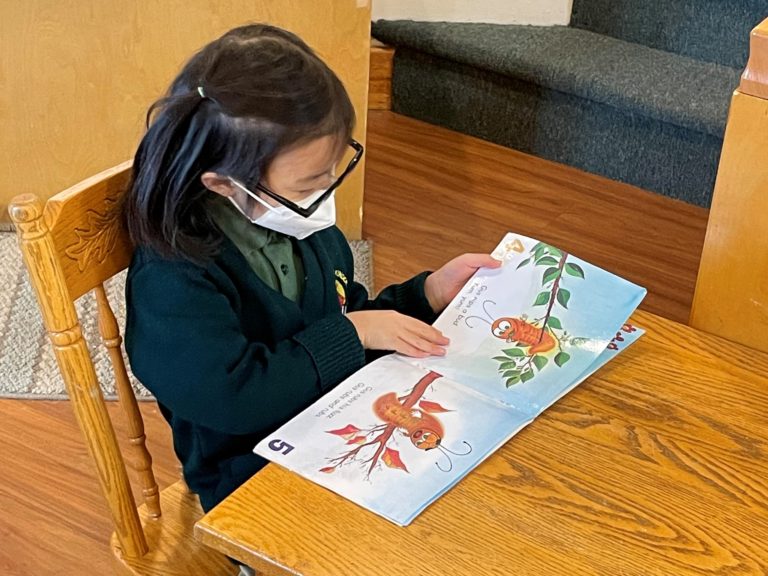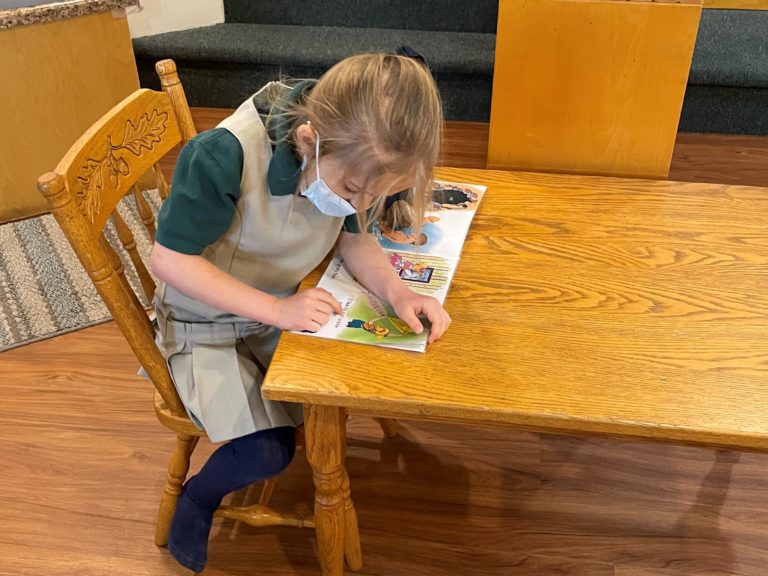During the past few months, we have explored the development of both decoding sounds and language comprehension. As a review, decoding is the ability to apply knowledge of letter-sound relationships to correctly pronounce written words. Language comprehension is the ability to derive meaning from spoken words. It has nothing to do with printed letters on a page, but is really all about oral language.
When we put these two skills together through a variety of activities, the children develop a stronger ability to have a good foundation for reading comprehension, which is our goal for developing a great reader.
When we talk about reading comprehension, we are talking about using print to read the words on the page and make meaning from those words. That means language comprehension becomes reading comprehension when print is involved. When we read with young children, it is best to help them develop reading comprehension strategies, however, we should never ask questions about a story to quiz a child about the facts. Instead, you should make your discussions around the book like a simple conversation with lots of open-ended questions and you’ll encourage a more positive relationship around reading.
Strategies to Practice Reading Comprehension
As you are reading with your little ones, here are five comprehension strategies you can focus on to help them practice and develop reading comprehension.
Connect the Story
When I read one of our favorite books, “Little Blue Truck” by Alice Schertle, I try to help the children connect what’s happening in the story with something in their own lives, other books they’ve read, or with the world around them. For example, “Have we read any other books with farm animals?” or “Do you remember the time we visited the farm? What animals can you remember seeing there?”
Ask Open-Ended Questions
Asking open-ended questions encourages children to focus on the story. Some general open-ended questions include:
- What do you think will happen next?
- Tell me about a time when…”
- What does this make you think of?
- How might the character (use the actual character’s name) solve this problem?
- What was your favorite part?
Some open-ended questions to ask about the book “Little Blue Truck” are:
- What was your favorite part of “Little Blue Truck?
- What do you think will happen the next time the Dump Truck drives through the farm?
- Do you think you’re more like Little Blue or the Dump Truck? Why?
Visualize
Visualizing is a key component for strong readers. You can encourage your child to make ‘mind images” when you’re reading with them by having them close their eyes and describe what they’re “seeing” as you read. For example, ”Close your eyes while I read this part. What do you see in your mind? Where do you see the animals? Where do you see Little Blue? Open your eyes. How were your mind images the same as the illustrations in the book? How was it different?”
Be a Detective
It’s time to be a detective! Have your little one look for clues in the story and combine them with what they already know to make inferences. Question to ask:
- Why is the Dump Truck acting that way?
- Why does he think he’s so important?
- How are his actions making the animals feel?
- Have you ever felt this way?
- What does that tell you about the Dump Truck?”
Find the Lesson of the Story
Lastly, help your child figure out the most important parts of the story and the lesson the author is trying to teach them. Ask questions to start a discussion:
- What can we learn about friendship from Little Blue?
- What does the author want us to know after reading this story?
A researcher from the University of North Carolina Greensboro, Alan Kamhi, stated that “Comprehension is not a skill. It’s a complex of higher level mental processes that include thinking, reasoning, imagining and interpreting.” He believes that comprehension is knowledge-based, not skills-based and it’s not something that is easily taught. Therefore, it is very important to give our children time and space to learn these skills in a loving and supportive setting so they can develop good reading comprehension skills.

